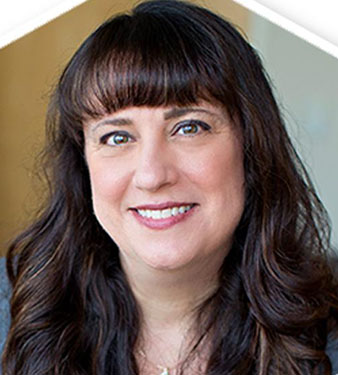Feb. 18 is National Caregivers Day, which honors individuals who provide personal care and physical and emotional support to those who need it most. More than 40 million people provide care nationwide. Their hours are long, the work is stressful and it often takes a toll on the caregiver's health.
Below is a Q&A that addresses a wide range of issues faced by caregivers. Helen Kales is a geriatric psychiatrist and an expert in helping caregivers manage the complex care needed by people with dementia and Alzheimer's disease. Terri Harvath is the director of the Betty Irene Moore School of Nursing Family Caregiving Institute and consults with family caregivers in the new Healthy Aging Clinic.
Caregivers can feel invisible to their family, friends and health care teams. Why is it important to acknowledge their contributions?
HARVATH: Family caregivers are the linchpin in the care for older adults. They are the ones who implement any plan of care that we have for patients when they leave our hospitals and clinics. In addition, they often have a deep understanding of how illness symptoms manifest and can detect subtle changes in condition that are clinically important. A recent study from AARP documents the complexity of care that families often provide with little to no training. To ensure families can provide safe and competent care, we must recognize the vital role they play in the care of frail, older adults and offer them the education and support they so desperately need.
What are some common misconceptions about caregiving?
KALES: Caregiving is often presented as a completely negative thing in our society. But there are a lot of studies that show caretaking has benefits. Some of it depends on what your relationship was like with the person before caretaking, but for a lot of people, it can bring families closer. There can be a lot of meaningful shared experiences, especially if you can laugh. People who can find humor in situations and are able to cope with humor generally look at caretaking more positively.
HARVATH: It is important to note that most families want to provide care to their older relatives and only relinquish that care when the person's needs exceed what the family can provide. We don't adequately prepare family caregivers for the complex role they take on. We need to help them understand how to detect subtle changes in the older person's condition before it becomes a serious threat to their health. We need to teach them how to manage complex care tasks (e.g., catheters, oxygen, injections) so they feel comfortable providing care and know when to ask for more help.
If we support family caregivers and include them as both a member of the older person's care team and a target of our interventions, we can deliver better, family-centered care in the community where most older adults prefer to remain.
Caregivers provide roughly $470 billion in unpaid assistance. Who is at risk when their health needs are not met?
HARVATH: Family caregivers often set their own health needs on the back burner because of the demands of their caregiving situation. This means that they are often sicker when they finally do seek care, adding to the illness burden they experience. This can jeopardize care for their older family member, taxing our long-term care system further with the care families can no longer provide.

What are some misconceptions about caring for people with Alzheimer's disease or dementia?
KALES: One misconception is that people think of Alzheimer's disease as a memory problem — which it is. However, it is much more than that. Everyone with dementia has behavioral changes. Those can include agitation, depression, aggression, hallucinations, wandering and others. Behaviors like these are the most difficult, stressful, and costly aspects of care and often cause caregivers the most stress and depression.
What are some of the underlying reasons for these behavioral changes?
KALES: Sometimes, the behavior happens because the person lacks the ability to communicate. Maybe they are hungry, thirsty, or tired, and their behavior is an expression of an unmet need. Or it could be an expression of pathologies, such as being in pain or having an infection or an injury. The change in behavior tells us that something is happening that we need to pay attention to. Rather than memory, behavior is what puts people in nursing homes, and the reason there is an overuse of psychiatric medications for people with dementia. About 70% of people with dementia are put on psychiatric medications; much of that prescribing is for sedation.
What is the DICE method? How can it help caregivers with behavioral changes?
KALES: DICE stands for describe, investigate, create and evaluate (DICE). It is designed to help caregivers take care of people with dementia, but it can be a useful technique for other caregivers. It's very common for people with dementia to be prescribed sedating medication. The goal of DICE is to have their symptoms assessed and treated like any other symptom. For example, if you went to a doctor and said, 'I'm short of breath,' and the doctor immediately said, 'you must have pneumonia,' you would think you were going to a quack. You expect the doctor to investigate your symptoms before arriving at a conclusion. The same should be true for patients with dementia or Alzheimer's disease.






